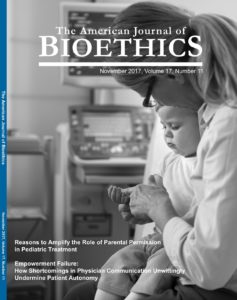This post is written in response to Ubel, Scherr and Fagerlin’s target article, “Empowerment Failure: How Shortcomings in Physician Communication Unwittingly Undermine Patient Autonomy” published in the November 2017 issue of The American Journal of Bioethics.
by Haavi Morreim, JD, PhD and Mark C. Bugnitz, MD
Communication is one of the most important skillsets in healthcare. As Ubel et al. describe in their American Journal of Bioethics article so well, inadequate communication can effectively deprive patients of the medical path that best fits with their personal goals and values – potentially leaving them, as in the example of prostate cancer, with an outcome that may be deeply dissatisfying.
 The Joint Commission reports that communication failures are a root cause in nearly 70% of reported sentinel events. Similarly, Sutcliffe et al found that 91% of medical mishaps reported by medical residents were associated with communication difficulties, finding that communication failures are not simply a result of poor transmission or exchange of information, but were far more complex. They were related to “hierarchical differences,” concerns with upward influence, conflicting roles and role ambiguity, and interpersonal power and conflict. Poor communication can also fuel patient/family dissatisfaction, “difficult” patients, staff burnout, and a host of other problems.
The Joint Commission reports that communication failures are a root cause in nearly 70% of reported sentinel events. Similarly, Sutcliffe et al found that 91% of medical mishaps reported by medical residents were associated with communication difficulties, finding that communication failures are not simply a result of poor transmission or exchange of information, but were far more complex. They were related to “hierarchical differences,” concerns with upward influence, conflicting roles and role ambiguity, and interpersonal power and conflict. Poor communication can also fuel patient/family dissatisfaction, “difficult” patients, staff burnout, and a host of other problems.
To address this need, all interns in pediatrics and in the combined medicine-pediatrics residencies at the University of Tennessee College of Medicine participate in a full-day “Communication Bootcamp.” Nurses are included in a one-to-one ratio with interns, ensuring broader diversity and adding another important perspective on day-to-day communication challenges.
The workshops are co-led by a critical care physician and by a bioethicist who is also a mediation trainer and court-annexed mediator. During the morning, a “toolbox” of communication skills and strategies is presented via a combination of didactics and videos. Each cluster of skills is reinforced as intern/nurse dyads practice the skills in various scenarios capturing real clinical cases. These skills include: probing for information, using neutral language, restating and summarizing, modeling, mirroring, and affect labeling.
Modeling involves exemplifying, in one’s own demeanor, some specific nonverbal dimensions that can help to reduce tension in a conversation. During highly emotional speech the voice tends to be rapid and higher-pitched, accompanied by abrupt gestures. Good nonverbal communication requires open, smooth gestures, a moderate (not rapid) pace of speech, and somewhat lower pitch – all of which can require conscious effort to control. Modeling desirable nonverbal communication can help others in the conversation to become calmer and thereby better able to process difficult issues more rationally.
Mirroring can be either verbal or physical. Adopting the seating position or gesture style of one’s conversation partner can display, or sometimes even induce, a greater affinity between those two people. Simply repeating the last three-to-four words of someone’s statement as a question can encourage that person to say more. Judiciously used, these techniques can encourage a better connection and a deeper level of conversation than might otherwise be attainable.
Affect labeling involves discerning, and naming aloud, the emotion the other person is displaying. For example, “It looks like this has been pretty frustrating for you.” Through affect labeling, people in an emotionally difficult situation often feel heard, in a more profound way than could otherwise be achieved through less deliberative conversation. Lieberman et al. have shown via fMRI that when used appropriately, naming an emotion transforms it into an object of scrutiny, disrupting its raw intensity. That is, affect labeling can help the person to move from a highly emotional state into a more rational mode.
Other strategies taught during the workshop include: normalizing, managing expectations, asking permission, and starting slowly enough to build the kind of trust that can then produce more effective, efficient, collaborative decision-making.
To build effective relationships that permit patients and families to seek what is most important to them, and likewise to permit physicians and colleagues to provide care of the quality that befits their profession, it is imperative to learn the basic skills and strategies that enable a mutuality of exchange. Not a one-way “I recite and you listen,” but rather a reciprocal exploration that is the foundation informed consent, of conflict management and, more broadly, of a rewarding physician-patient relationship.